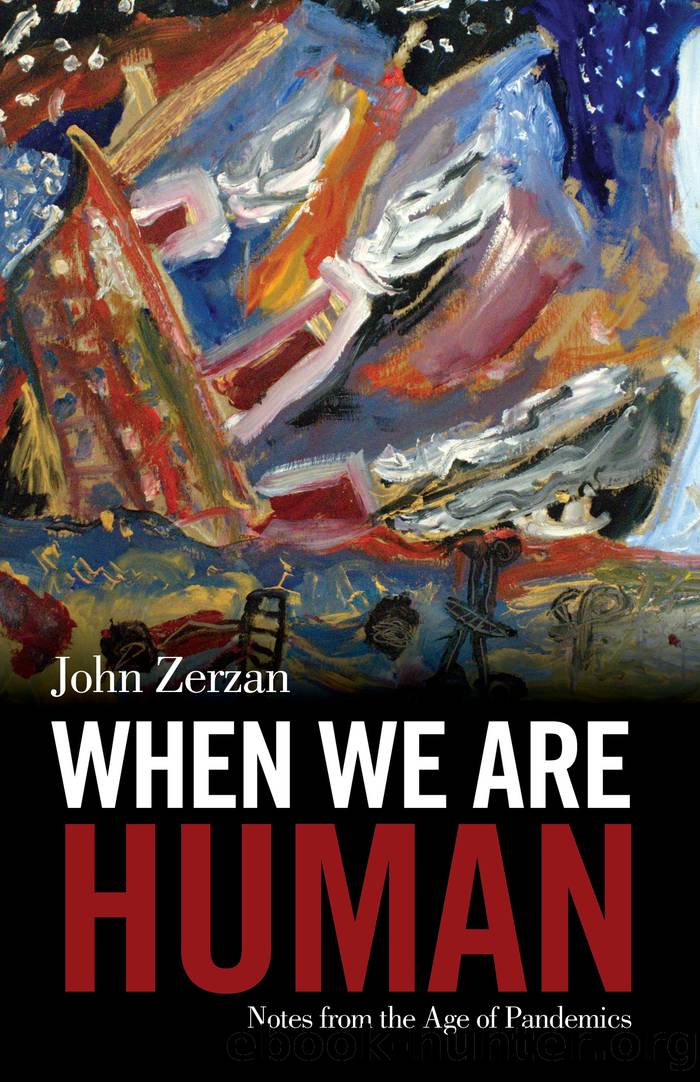When We Are Human by John Zerzan

Author:John Zerzan
Language: eng
Format: epub
Publisher: Feral House
Published: 2021-10-15T00:00:00+00:00
NOT SO CLOSE ENCOUNTERS: DISTANCED IN THE AGE OF AUTISM
For about a century, scientists have known that all of the galaxies are flying apart from each other, which may be a very apt metaphor for our epoch of social existence. We are hurtling away from each other in a kind of explosion, but our universe, unlike the physical one, is contracting, not expanding.
We are outdistancingâand impoverishingâthe natural world as we ride along on a terrible voyage of distancing. The word distance means a stance or standing apart or away. The historical development of civilization and Enlightenment goes on and on, but where are the promised emancipations, where is a basis for community? Instead there is separation, remoteness and their consequences. As philosopher Bruce Wilshire asked, âAt the time of the so-called triumph of the West, why do so many people feel so crappy, so lonely, so abandoned?â1 Health professional John G. McGraw added that âloneliness and other negative states of aloneness can pathologize people,â2 a phenomenon we see, for example, in growing random violence. âNo sense of direction, we Americans./No place to go,â wrote Carolyn Kizer.3
Distanced, apart, as we so steadily seem to be, a sense of unreality takes hold. In the functional society of technology, dysfunctional behaviors and conditions abound. Even the incidence of Alzheimerâs at ever earlier ages is implicated, as a function of loneliness.4 In 1991 Daniel Goleman addressed âdissociative disorderââa malady of growing prominence, the third most common psychiatric disorder after anxiety and depression: the feeling that one is an automaton.5
The social world is fragmented and there is indeed a worrying trend toward greater fragility and emotional instability. The most severe example is likely autism, for which the prevalence estimates have risen almost exponentially.6 If the capacity for empathy is a defining feature of human relationships, autistic individuals are more or less cut off from the human experience. Characteristically, they donât like to be touched. Autism literally means âselfâ-ism and is an inability to form affective, emotional contact with others, living in âa world in which they have been total strangers from the beginning.â7 A remarkable parallel, on a deeper level, with the fact that recent decades have witnessed a striking diminution of contacts with friends and neighbors.8
Autism has been described as a marked exaggeration of masculine traits. Heavily affecting males over females, it strongly values systemization, not empathy, and engages with reality minus social interaction. Obsessive, rote behavior (e.g., strict attachment to routines) mimics the high-tech culture, which of course is also a male domain. Temple Grandin, herself autistic and probably the most well-known writer on the subject, has said there would be no Silicon Valley without folks from various parts of the autism spectrum.
These few lines donât even scratch the surface of the reality of the topic. Stuart Murray, who is both parent and healer, observes that âWe might care less about causes if we knew exactly what it means to live with autism.â9 As Clara Park put it, âAutism is when your two-year-old looks straight through you to the wall behind.
Download
This site does not store any files on its server. We only index and link to content provided by other sites. Please contact the content providers to delete copyright contents if any and email us, we'll remove relevant links or contents immediately.
Sapiens: A Brief History of Humankind by Yuval Noah Harari(13036)
Sapiens by Yuval Noah Harari(4528)
Homo Deus: A Brief History of Tomorrow by Yuval Noah Harari(4272)
Pale Blue Dot by Carl Sagan(3995)
Origin Story: A Big History of Everything by David Christian(3133)
Livewired by David Eagleman(3113)
Brief Answers to the Big Questions by Stephen Hawking(2871)
Inferior by Angela Saini(2828)
Origin Story by David Christian(2677)
The Evolution of Beauty by Richard O. Prum(2549)
Signature in the Cell: DNA and the Evidence for Intelligent Design by Stephen C. Meyer(2495)
The Gene: An Intimate History by Siddhartha Mukherjee(2487)
Aliens by Jim Al-Khalili(2376)
How The Mind Works by Steven Pinker(2206)
Sex at Dawn: The Prehistoric Origins of Modern Sexuality by Ryan Christopher(2148)
From Bacteria to Bach and Back by Daniel C. Dennett(2143)
A Short History of Nearly Everything by Bryson Bill(2131)
Endless Forms Most Beautiful by Sean B. Carroll(2079)
Who We Are and How We Got Here by David Reich(2056)
